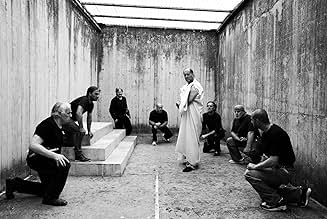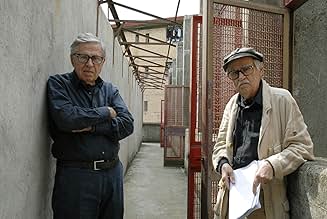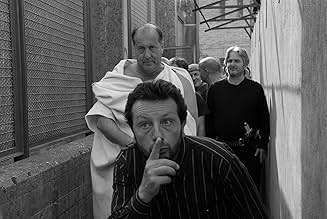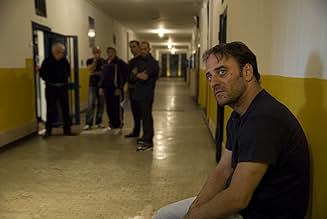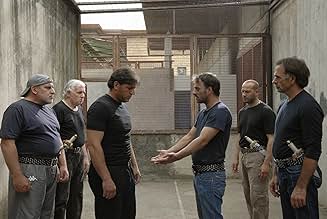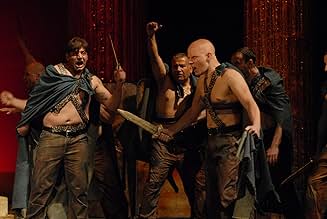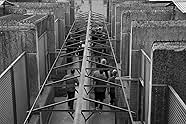VALUTAZIONE IMDb
7,3/10
6945
LA TUA VALUTAZIONE
Dei carcerati in una prigione ad alta sicurezza di Roma si preparano per una oerformance pubblica del "Giulio Cesare" di William Shakespeare.Dei carcerati in una prigione ad alta sicurezza di Roma si preparano per una oerformance pubblica del "Giulio Cesare" di William Shakespeare.Dei carcerati in una prigione ad alta sicurezza di Roma si preparano per una oerformance pubblica del "Giulio Cesare" di William Shakespeare.
- Regia
- Sceneggiatura
- Star
- Premi
- 16 vittorie e 21 candidature totali
Recensioni in evidenza
The Shakespearean 'All the world's a stage' gets a new meaning with this very interesting and very different film made by the Taviani brother whose actors and heroes are individuals for which the world is the high security prison where many of them are to spend long years paying for serious crimes. Using theater as a mean of therapy end education happens in some of these prisons, now a film not only dares to make this process known and visible outside the perimeter of the prison, but also tries to make of it a work of art. The Golden Bear at the Film Festival in Berlin is a proof that the Taviani brothers succeeded to convince at least the critics and members of the jury. I get the feeling that the larger public was less convinced - it's a very interesting piece of cinema, but not one of these that attracts audiences in numbers. This is not entertainment.
In one of the introductory scenes we see a screen test. The actors-to-be are asked to introduce themselves in two situations - a 'soft' family one, and a second which demands them to feel constrained and express rage. Each of them acts with a mix of sincerity and intensity that much exceeds and compensates their lack of professionalism. This is the key of the film. We have already seen theater in theater (Shakespeare himself is the first and maybe greatest master of the genre) and theater about prisons, and many of these were already brought to screen. What we have never seen before is the mix of situations which makes the walls of the prison disappear for the ephemeral moments when the words of the ancient drama become the reality of life for the prisoners acting it.
The film asks many questions which arise after the screening ends. Julius Caesar is a play about values - honor, democracy, freedom. How do the prisoners relate to these? The characters of the play are cruel in modern terms, the plot is also about treason and murder - how do these men who have committed serious crimes relate to these deeds? Some of the most interesting moments in the play (and there are only a few of them) are these in which real life (which for the actors is life in prison) interferes in the scenes of the play. I found the smooth, sometimes unobserved, sliding of life in a 21st century prison into the political drama that took place in the first century BC to be terrifying.
And then we have the ending. The show is over, it ends in applause and ovations. Then the actors get back to what is their 'home' - the prison where most of them still have to spend many years. What we do understand is that life cannot go on without such a film changing it. The lives of the special actors in this movie, but to some extent the lives of the spectators as well.
In one of the introductory scenes we see a screen test. The actors-to-be are asked to introduce themselves in two situations - a 'soft' family one, and a second which demands them to feel constrained and express rage. Each of them acts with a mix of sincerity and intensity that much exceeds and compensates their lack of professionalism. This is the key of the film. We have already seen theater in theater (Shakespeare himself is the first and maybe greatest master of the genre) and theater about prisons, and many of these were already brought to screen. What we have never seen before is the mix of situations which makes the walls of the prison disappear for the ephemeral moments when the words of the ancient drama become the reality of life for the prisoners acting it.
The film asks many questions which arise after the screening ends. Julius Caesar is a play about values - honor, democracy, freedom. How do the prisoners relate to these? The characters of the play are cruel in modern terms, the plot is also about treason and murder - how do these men who have committed serious crimes relate to these deeds? Some of the most interesting moments in the play (and there are only a few of them) are these in which real life (which for the actors is life in prison) interferes in the scenes of the play. I found the smooth, sometimes unobserved, sliding of life in a 21st century prison into the political drama that took place in the first century BC to be terrifying.
And then we have the ending. The show is over, it ends in applause and ovations. Then the actors get back to what is their 'home' - the prison where most of them still have to spend many years. What we do understand is that life cannot go on without such a film changing it. The lives of the special actors in this movie, but to some extent the lives of the spectators as well.
It's rather discardable. The directing brothers were frustrated as they tried to create something as interesting as Kaos, Fiorile or Luisa Sanfelice. If this is up to the Golden Berlinese Bear, it's a sign of how low the level of current productions is. This is meta-theatre, set in Rebibbia, a high-security prison in Rome. The performers are real life convicts. "Cesar must die addresses the links between drama and reality , but working with amateurs didn't help. The film may be useful as kinda sociological propaganda, but it never qualifies as 'Cinéma vérité,' the meta-style of fiction-documentation filmmaking developed by Edgar Morin and Jean Rouch, inspired by the former theories about Kino-Pravda. I do call it a kind of Reality Show, though. Aren't Inmates Survivors & Big Brothers who are Keeping Up with the Roman Kardashians after all? ;-)
I saw the world premiere of this movie at the Berlinale, where it won the golden bear last night. The movie is not bad, but also not special. The basic idea -real prison inmates play Shakespeares "Julius Caerar"- makes the movie interesting and the impressive acting makes you often forget, what fate those men face and what brought them to prison (murder, mafia-crimes etc). But since you know all that from the promotion already, the movie sometimes just leads up to watching an old Shakespeare-play, which we also already know. Just some philosophic aspects (at the end) and the idea of not showing the actual play, but the criminals only practicing it most of the time, is very entertaining.
Taviani Brothers'2012 Golden Berlin Bear winner, saw the screening in this year's KVIFF, an intensely conceptual piece which recounts a play of "Julius Caesar"done by all-male prisoners. Shot entirely in Black & White, the film generates a certain art form extremity of blurring the boundary between play and film, and takes advantages of the indoor settings (which almost encompasses the entire film except for a few shots), the final result is gratifyingly diverting, both the film and the play-in-the-film.
I have only watched one Taviani Brothers' film before, ALLONSANFAN (1974, a 5/10). So I need to do more homework to comment on their style or expound on their near 60 years long walk- of-life. Simply single out this film, its artistic frontier has transcended other peers and condensed into a puristic absorption on the material itself, namely, the characters of the play and the individual prisoners who take on the roles, and strikingly their distinctions and similarities are undone in a yet refrained way. There are affluent theatrical nuisances in the film, although it only runs a scant 76 minutes, the film successfully conveys its ethos and every second counts.
Salvatore Striano stars the leading role as Bruto, his rough-edged dedication is imperfect but authentic, other supporters, the stand-outs are Cosimo Rega's Cassio and Juan Dario Bonetti's Decio, but by and large the amateur antics are put into the right place, and the absorbing original score by Giuliano Taviani and Carmelo Travia also lifts the film into a great adaption from Shakespeare's cannon. It's a true blessing to justify the fact that directors could surpass themselves even at their octogenarian years.
I have only watched one Taviani Brothers' film before, ALLONSANFAN (1974, a 5/10). So I need to do more homework to comment on their style or expound on their near 60 years long walk- of-life. Simply single out this film, its artistic frontier has transcended other peers and condensed into a puristic absorption on the material itself, namely, the characters of the play and the individual prisoners who take on the roles, and strikingly their distinctions and similarities are undone in a yet refrained way. There are affluent theatrical nuisances in the film, although it only runs a scant 76 minutes, the film successfully conveys its ethos and every second counts.
Salvatore Striano stars the leading role as Bruto, his rough-edged dedication is imperfect but authentic, other supporters, the stand-outs are Cosimo Rega's Cassio and Juan Dario Bonetti's Decio, but by and large the amateur antics are put into the right place, and the absorbing original score by Giuliano Taviani and Carmelo Travia also lifts the film into a great adaption from Shakespeare's cannon. It's a true blessing to justify the fact that directors could surpass themselves even at their octogenarian years.
10ibarradj
I saw this at the Palm Springs Film Festival and was blown away! As soon as the movie began, I could tell it was a movie that I should pay attention.
The plot is a performance of Shakespeare's Julius Caesar by a group of real-life prisoners in an Italian prison. I loved how the prisoners could relate to the play by seeing the parallels in their own lives--the power lust, deceit and betrayal. The more the prisoners understood the play, the more they became immersed in their roles.
There have been many attempts to make Shakespeare palatable to the modern audience. This was my favorite iteration because it showed the actors trying to understand it, just as an audience might try to find the relevance. As a high school student, I found Shakespeare and Roman History boring. It wasn't until I hit my 40s did I realize this history was more violent than the Sopranos.
I don't know if this movie has ever been widely released. I highly recommend seeing it if it ever comes to your town.
The plot is a performance of Shakespeare's Julius Caesar by a group of real-life prisoners in an Italian prison. I loved how the prisoners could relate to the play by seeing the parallels in their own lives--the power lust, deceit and betrayal. The more the prisoners understood the play, the more they became immersed in their roles.
There have been many attempts to make Shakespeare palatable to the modern audience. This was my favorite iteration because it showed the actors trying to understand it, just as an audience might try to find the relevance. As a high school student, I found Shakespeare and Roman History boring. It wasn't until I hit my 40s did I realize this history was more violent than the Sopranos.
I don't know if this movie has ever been widely released. I highly recommend seeing it if it ever comes to your town.
Lo sapevi?
- QuizPaolo and Vittorio Taviani heard about the prisoners acting program and contacted Fabio Cavalli with the idea of doing Shakespeare's play and shot the whole experience.
- ConnessioniFeatured in Film '72: Episodio datato 27 febbraio 2013 (2013)
I più visti
Accedi per valutare e creare un elenco di titoli salvati per ottenere consigli personalizzati
- How long is Caesar Must Die?Powered by Alexa
Dettagli
- Data di uscita
- Paese di origine
- Siti ufficiali
- Lingua
- Celebre anche come
- Caesar Must Die
- Luoghi delle riprese
- Aziende produttrici
- Vedi altri crediti dell’azienda su IMDbPro
Botteghino
- Lordo Stati Uniti e Canada
- 76.908 USD
- Lordo in tutto il mondo
- 1.567.339 USD
- Tempo di esecuzione
- 1h 17min(77 min)
- Colore
- Mix di suoni
- Proporzioni
- 1.85 : 1
Contribuisci a questa pagina
Suggerisci una modifica o aggiungi i contenuti mancanti


